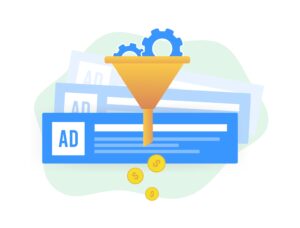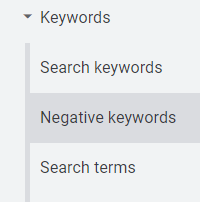Spending more than you should be on PPC? You could be breaking the bank without even realising, gaining little results while wasting funds. With an always adapting online landscape, PPC ads are a must for promoting your online store- PPC for ecommerce can generate your business substantial revenue, but the risk of wasted spend lingers.
You may find yourself thinking, what’s going wrong? How can I eliminate the risk of wasting money? Well don’t panic, as we’re here to help you with these 7 tactics to avoid wasted spend in your PPC campaign! You’ll be sure to optimise your budget in no time.
The 7 Key Tactics
Below you’ll find 7 key approaches that limit wasting any budget for your PPC campaign. Let’s get started:
1. Eliminate keywords that don’t convert
You could be spending so much of your budget on keywords that don’t even convert. This is a key area that could be wasting your money. This can be tricky if a non-converting keyword is integral to your service, but there are clever ways to go about writing optimised copy that can use this keyword cleverly.
However, if the keyword can be removed, then it’s worth doing so to maximise total profit. Filter your settings to be able to view the previous month, and pinpoint which words haven’t received any conversions. Remove and replace with keywords that will attract more clicks, using some short-tail and long-tail. Aim to target whatever keywords suit your business and attract your target audience.
I asked PPC lead, George Noon, how to avoid wasteful keywords:

“If you’re starting an account fresh, one good tip would be to be a bit counter-intuitive and avoid the highest search-volume keywords.
While you’d think these would be ideal to target, in our experience its better to try and target more “longtail” or “modified” keywords, as these tend to have more intent behind them, whereas a high-volume broad keyword could spend a lot, but have little purchase intent behind the search.
Just because there are 100k users searching for “X” each month, it might be that the most value comes from the users who are just searching for “Y” 2k times a month.
Better to start small, get some wins, and then look to grow via higher-volume keywords with the insights you gained with the smaller-volume keywords. Another thing you can do is try and think of connotations around your targeted keywords.”
2. Check your conversion tracking
Tracking is so important for staying on top of your campaign. Without proper conversion tracking in place, it’s hard to determine how successful your campaign actually is. Areas of wasted spend will go unnoticed, and the problems you face won’t be spotted and rectified. With correct tracking, you’re able to monitor spend and the performance of your ads and landing pages.
Conversion tracking can also tell you when users perform a desired action, and where these customers are located. From this, you know if your ads are reaching the right people in the right place.
3. Double check your settings

From the get go, your PPC campaign settings should be set best for your needs and budget optimisation. Incorrect settings can quickly lead to a loss in spend and wasted efforts on things that your business doesn’t need. For example, make sure your ads target the right audience with things like location- there’s no point spending money on an ad that will reach people in different locations who won’t use your business.
You should also double check the display network and whether it should be manually turned off for your campaign. If you don’t want it for your campaign, then you’ll unfortunately be playing for clicks that you don’t actually need or want. Another setting to check is broad keywords. Instead of wasting spend on very vague or broad search terms, it’s best optimising for more specific phrases.
4. Utilise negative keywords

If negative keywords are missing from your campaign, this runs the risk of wasting spend on irrelevant keywords- less room is left for the key phrases that are bound to drive conversions. Negative keywords are essentially phrases and words that advertisements are prevented from displaying. Your paid ad won’t appear to users searching for the negative keywords.
Using negative keywords can help save you money as you no longer have to pay for clicks generated by uninterested users and those who aren’t customers. Improved ad placement follows as a result, and overall conversions are boosted.
5. Stay on top of budget
A sufficient budget is often required for Google Ad campaigns due to its competitive nature. Even if you bid highly, you may not have enough budget to cover the clicks. Staying on top of your budget lets you balance how highly you bid and what you’re willing to have as a budget. Knowing what you can afford helps keep you from overspending or wasting the spend, but flexibility is key in accordance to what results will tell you.
6. Adjust bids accordingly
Bid adjustments allow you to wisely use spend in a way that will benefit your campaign. For example, bidding higher for keywords that are exact matches to what you want is better than bidding highly for broad search terms. The specific keywords are likely to generate more business, and it’s a waste of budget trying to bid high for broad terms.
Adjusting your bids also allows you to make them based on a number of factors such as:
- Location
- Device
- Age
- Gender
- Time of day
- And more!
These adjustments allow you to bid higher or lower based on what they tell you- for example, a click can be more beneficial to your business at a certain time of day.
7. Optimise landing pages
Landing pages are where users land after clicking on your ad. The landing page experience tells them if their click was really worth it. Page speed must be optimised to load quickly for the user, and it must show the type of business it reflected on the ad. Users want immediate access to what they’re looking for, and the landing page should aim to give them this.
How Embryo can help your PPC campaign
At Embryo, our PPC consultants approach campaigns efficiently, boosting performance of online sales all while investing in what matters. With our help, instant traffic can be brought to your site by placing your brand at the very forefront of Google.
Want to know more? Feel free to get in touch today!
FAQs
Answered by Tom McGuigan
What can wasted spending be caused by?
Improper campaign setup is the main culprit, whether that’s with bidding strategies that are too aggressive, budgets that are too high, or campaigns spending too much on search terms/products that don’t return results.
What is conversion tracking?
Conversion tracking is the method by which you ultimately learn if your current activity is achieving certain results and actions that you want. It’s fundamental to understanding just effective your marketing activity is.
For new campaigns should I manually change bids or set them automatically?
The best practice is to start with manual bidding and then switch to automatic bidding once enough data has been accumulated. However, there are no golden rules, so I’d say it’s best to experiment.














